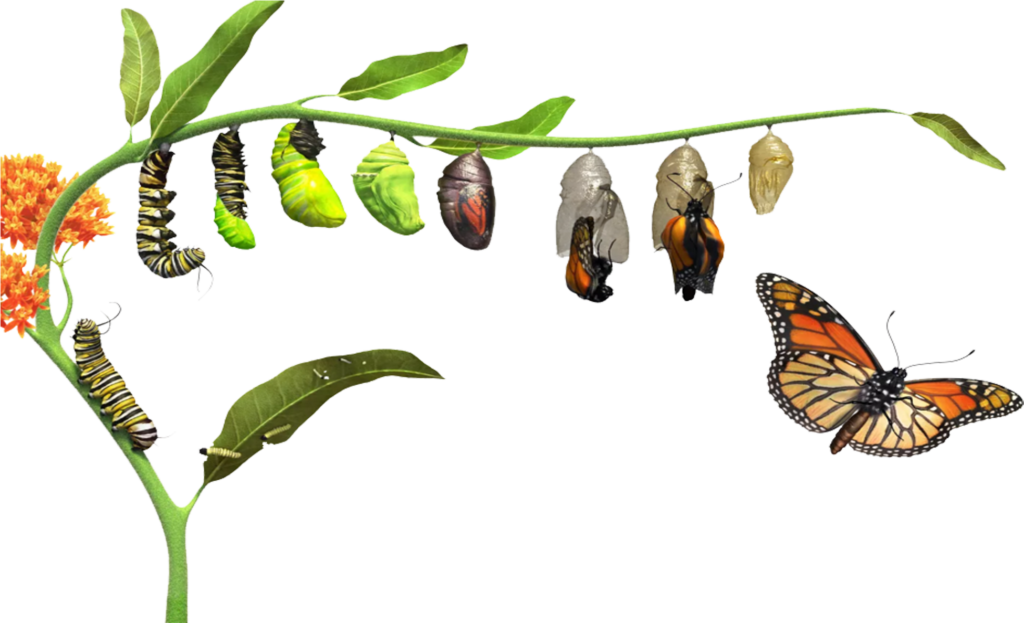What the caterpillar calls the end of
the world, the world calls a butterfly.
Jonathan Livingston Caterpillar was not like the others.
While his fellow caterpillars spent their days munching leaves and inching across twigs, Jonathan would stop and stare at the sky. He would watch the birds dip and glide with such effortless grace that it made his heart ache. He dreamed not of the next meal or the next branch, but of rising — of becoming one of them, a creature of air and light.
“Why are we confined to the earth?” he would ask. “Why do we settle for crawling, when we could be flying?”
The other caterpillars laughed at him.
“Flying?” they scoffed. “You’re a caterpillar. We were born to crawl, to eat, and to survive. That is the way of things.”
But Jonathan was not content with the way of things.
“There is more,” he said quietly. “I feel it. A change is coming — not just for me, but for all of us. A transformation. A kind of death, yes, but beyond it — a life we’ve never imagined. We could be beautiful. We could soar.”
“That’s dangerous talk,” one old caterpillar hissed. “Dreams like that can get a young crawler hurt.”
When Jonathan would not stop speaking of impossible heights and invisible wings, they shunned him. They turned away when he approached. They whispered and glared. Eventually, they cast him out.
Alone and heartsick, Jonathan wandered far from the colony. He climbed the highest stems, tried to launch himself from leaves, flailed in the wind — and fell. Again and again he tried to fly, only to crash back to the earth, bruised and broken. His body was not made for flight. Not yet.
But his spirit refused to yield.
“I will not crawl forever,” he whispered. “I was not born to die a caterpillar.”
One day, exhausted and hollow, Jonathan climbed to a slender branch at the edge of the world. He clung to it with trembling limbs. He would not eat. He would not move. He would not crawl again. If transformation did not come, then let him die here — still reaching, still dreaming.
Days passed. His strength faded. His grip weakened until he hung by a single foot, barely alive.
Then, in the silence, something within him began to stir.
A stillness deeper than exhaustion. A darkness softer than death. A kind of becoming.
Wrapped in stillness, Jonathan entered the long sleep. The world disappeared.
Time passed — how long, he could not know. But slowly, impossibly, he emerged.
When he awoke, he was no longer Jonathan Livingston Caterpillar.
He was something new.
Delicate wings unfurled beside him, veined with color and light. His form was lighter, lifted by the breeze. For the first time, he felt less than the pull of the earth. He stretched, shook, fluttered.
And then he flew.
At first, he wobbled. The wind pushed and spun him. But soon his movements grew sure, precise, radiant. He climbed into the sky — and danced on the wind.
Below, the caterpillars crawled on, unaware. Jonathan looked down at them — his old friends, his doubters, his tribe. For a moment, his heart filled with sadness. They could not know what waited on the other side of fear.
But the sky called.
And so Jonathan Livingston Butterfly rose — higher, lighter, brighter — toward a horizon without end.
Richard Bach is an American writer and former U.S. Air Force pilot, best known for his inspirational novella Jonathan Livingston Seagull (1970). His writing blends allegory, mysticism, and personal philosophy, often exploring ideas of self-discovery, freedom, and the pursuit of higher purpose. Jonathan Livingston Seagull tells the story of a seagull who strives to transcend the limitations of ordinary flight. Bach’s books often focus on characters who defy conformity in search of truth and personal enlightenment.
*The top quote is adapted from Richard Bach:
“What the caterpillar calls the end of the world, the master calls a butterfly.”

